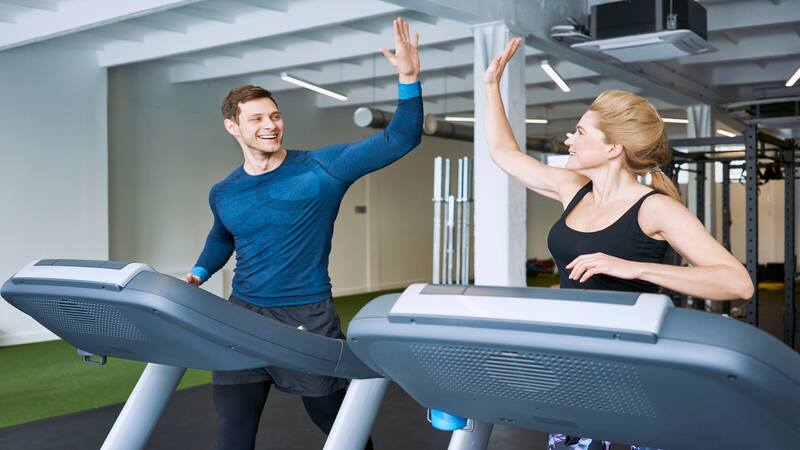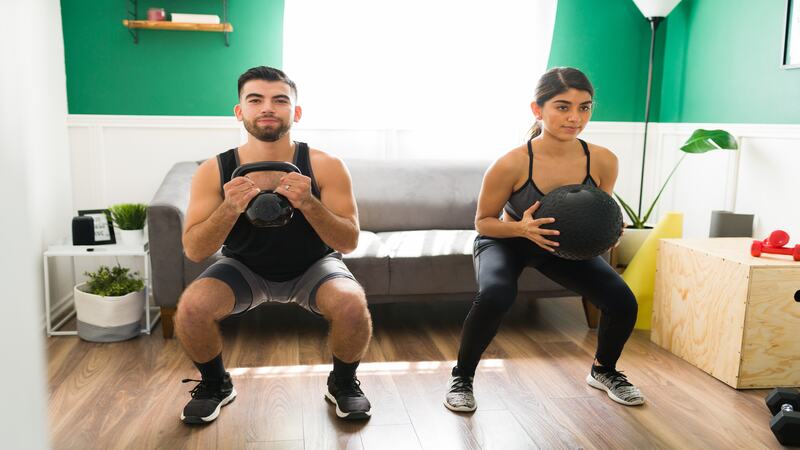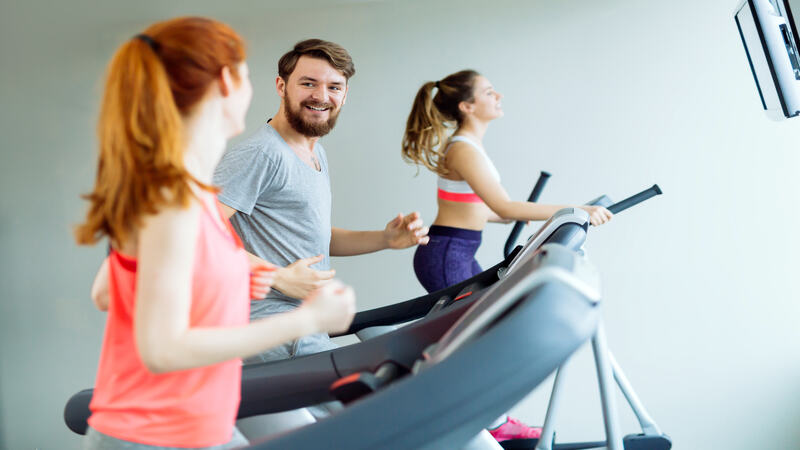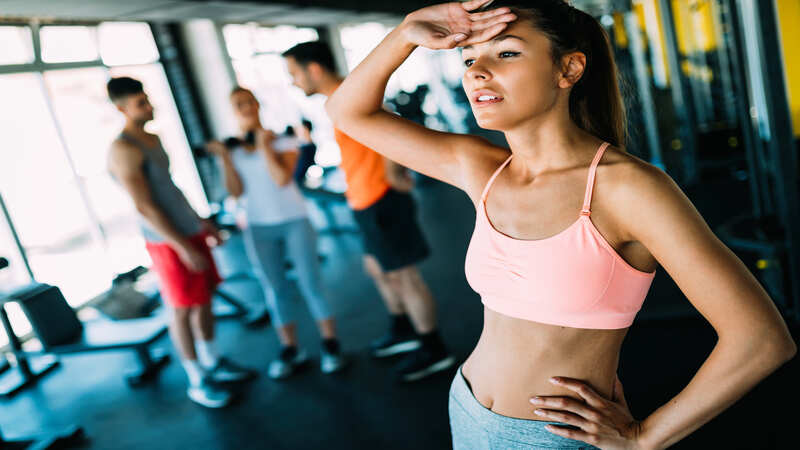
“Can I work out when trying to get pregnant?” is one of the most common questions, leaving many women in a dilemma. However, exercising can be beneficial to improve your overall fitness while improving the chances of conception. When it comes to high-intensity interval training or HIIT exercises when trying to conceive, they may provide you with positive results in most cases.
But continuing HIIT when trying to conceive may not be good for everyone. Some research studies indicate that HIIT beyond a point may interfere with your chances of getting pregnant successfully. In this article, we will spill the beans on HIIT exercises and how they can affect your body resulting in better fertility.
What Are HIIT Exercises?
Exercising for fertility is a great way to improve your overall health and conception chances.
HIIT is a combination of various short and intense exercises that last between 1 to 4 minutes. These are followed by regular short breaks for recovery.
HIIT exercises focus on toning muscles, burning fat, and increasing endurance (1). These exercises are a mix of speed and intensity-based exercises that boost cardiovascular health, leading to improved blood circulation. This may positively impact fertility, ovulation, and menstrual activity (2).
Typically, a HIIT workout lasts 10 to 30 minutes and can provide more benefits than regular exercises. They increase metabolism, boosts oxygen consumption, and regulate heart rate and blood pressure.
Additionally, they may help manage stress and anxiety, which is a contributing factor to delayed conception (3) (4).
Overall, HIIT can be a beneficial workout to achieve your fertility/pregnancy goals.
[Read: Top 10 Practical Tips to Reduce Stress When Trying to Conceive]
Can You Do HIIT Exercises When Trying to Conceive?

Staying active when trying to conceive can make your efforts worthwhile. Typically, HIIT exercises are safe; however, you must avoid overexercising.
When planning to conceive, it is good to consult your doctor to ensure better outcomes, especially if you have not exercised for a while or are suffering from health ailments (5).
Further, you can aim to perform strengthening exercises for all the major muscle groups followed by moderate and intense exercises at regular intervals.
HIIT exercises come with an array of advantages, from balancing hormones to managing the menstrual cycle and ovulation. This can further affect your chances of conception (6).
Impact of HIIT Exercises on Fertility

Regular physical activity can serve as a resilient state to ensure fitness while improving reproductive health.
Research indicates that exercise may improve ovulation in females and enhance sperm quality in males. Plus, HIIT exercises show positive effects on cardiovascular health and hormones in women with PCOS (7).
Here’s how HIIT exercises impact fertility.
1. Balancing Hormones
Health conditions and factors such as stress may disturb hormone balance by increasing cortisol levels (8). HIIT exercises in men can temporarily suppress testosterone synthesis which affects muscle regeneration and recovery.
In females, these exercises may regulate ovulation while impacting your reproductive health (9). Moreover, they may balance stress levels, such as adrenaline, contributing to a better fertility rate.
2. Maintaining Ovulation and Menstrual Cycle
Exercise can affect the synthesis of reproductive hormones such as estrogen and progesterone that regulate ovulation and menstrual cycle. These hormones influence the release of the egg, improving the pregnancy outcomes (10).
Moderately intense exercises balance the production of these hormones.
3. Improving Sperm Quality
When it comes to male fertility, exercise can enhance sperm functionality and quality (11). Moderate to intense exercises, when performed within limits, such as cycling, jogging, and running, can regulate the process of sperm production and quality.
However, excessive workouts can increase scrotal temperatures, reducing sperm quality and fertility rate (12).
[Read: Running When Trying to Conceive]
Are There Any Disadvantages of HIIT When Trying to Conceive?

In the quest to achieve your pregnancy goals, you may add HIIT exercises to your workout routine, pushing your body to the new limits.
Although HIIT exercise may be beneficial in various aspects, including boosting fertility, there may be a few disadvantages. These include;
a. Stressing Body
Overdoing HIIT exercises may stress your body. Although they are effective in toning your muscles and improving blood circulation, over-exercising may cause hormonal fluctuations affecting the fertility rate.
b. Increasing Body Weight
When you are involved in HIIT exercises, you may experience energy deficiency. And to replenish the devoid nutrients, you can be tempted to eat more than your regular diet. This increases your calories and weight. Having a high weight may inhibit regular ovulation, affecting the chances of conception.
c. Causing Injuries
Performing high-intensity exercises excessively or incorrectly imposes a threat of injuries. It may cause damage to sensitive joints. Further, people with pre-existing conditions such as arthritis, hypermobility, and osteoporosis are at a higher risk of injuries (13).
Precautions to Take With HIIT Exercises

Exercising while keeping a few precautions in mind can help enhance your workout journey. Some precautions are;
- Warm Up Thoroughly: A thorough warmup is essential to avoid strain, sprain, or injuries. It prepares your body to cope with the changes while exercising
- Maintain a Correct Posture: It’s crucial to maintain the right posture while exercising. A correct posture reduces stress on the body while exercising and prevents injuries or post-workout effects such as fatigue
- Avoid Overdoing: No matter whether you are a pro or beginner, it’s better to avoid overdoing. It can lead to soft tissue injuries and other problems. Plus, if you’re a beginner, it’s good to start slow and limit your workouts to an average frequency (maybe 2 to 3 times) per week. Also, ensure that you devote optimum time for the recovery. You may design a workout plan with shorter periods of HIIT exercises with longer rest periods. It’s better to seek professional help such as from a physiotherapist, to help you draft a customized workout plan
- Have a Healthy Diet: Pre-workout diet and nutrition are important aspects to take care of when exercising. You can opt for a balanced diet with the required amount of fats, carbohydrates, proteins, etc. Plus, it’s good to stay hydrated, so drink plenty of water so that your body doesn’t get devoid of essential minerals while exercising. Before you start, talk to your doctor to determine your body’s needs and work accordingly
When to Avoid HIIT Exercises For Fertility

HIIT exercises for fertility can be an effective way to increase the conception probabilities. However, these exercises must be avoided in case of pre-existing health issues, such as cardiovascular and respiratory problems or any other condition.
Further, if you’re experiencing fatigue, nausea, or discomfort, it’s better to stop exercising and relax. In any case, it’s good to consult a doctor to ensure better health.
HIIT when trying to conceive is one of the ideal ways to boost your reproductive health to ensure positive conception chances. These exercises improve blood circulation, manage hormonal imbalance, etc., to enhance your pregnancy journey. Moreover, it’s good to follow up with your doctor to keep a tab on your health.
[Read: Kegel Exercises For Fertility]
FAQ’s
1. Can Too Much Exercise Decrease Fertility?
Overdoing HIIT exercises may impact the fertility rate in both men and women. These can fluctuate hormonal levels and may lead to other physiological changes which can affect fertility. Plus, too much exercise may stress your body, which may cause problems with ovulation.
2. Can You Do HIIT When Trying to Conceive?
Yes, you do HIIT exercises when trying to conceive. These can be a great addition to your workout plan, leading to better outcomes. However, these exercises can be intense, and it’s better to consult your doctor to check your eligibility.
References
- Sharma, Ashish & Yadav, Narendra & Kumar, Abhishek. (2022). HIGH-INTENSITY INTERVAL TRAINING AND ITS IMPACT ON HEALTH -A REVIEW. 11. 2022. – https://www.researchgate.net/publication/366324474_HIGH-INTENSITY_INTERVAL_TRAINING_AND_ITS_IMPACT_ON_HEALTH_-A_REVIEW
- Minhal Mussawar, Ashley A. Balsom, Julia O. Totosy de Zepetnek, Jennifer L. Gordon,
The effect of physical activity on fertility: a mini-review,F&S Reports,Volume 4, Issue 2,
2023. – https://www.sciencedirect.com/science/article/pii/S2666334123000442 - Borrega-Mouquinho Y, Sánchez-Gómez J, Fuentes-García JP, Collado-Mateo D, Villafaina S. Effects of High-Intensity Interval Training and Moderate-Intensity Training on Stress, Depression, Anxiety, and Resilience in Healthy Adults During Coronavirus Disease 2019 Confinement: A Randomized Controlled Trial. Front Psychol. 2021 Feb 24;12:643069. – https://www.ncbi.nlm.nih.gov/pmc/articles/PMC7943442/
- ScienceDaily,High stress levels may delay women getting pregnant, study suggests – https://www.sciencedaily.com/releases/2010/08/100817111658.htm
- Mussawar M, Balsom AA, Totosy de Zepetnek JO, Gordon JL. The effect of physical activity on fertility: a mini-review. F S Rep. 2023 Apr 14;4(2):150-158. https://www.ncbi.nlm.nih.gov/pmc/articles/PMC10310950/
- Ida Almenning Kiel, Kari Magrethe Lundgren , Siv Mørkved , Sigrun Beate Kjøtrød, Øyvind Salvesen, Liv Bente Romundsta, Moholdt, BMJ Journals, BMJ Sports & Exercise Medicine, Women undergoing assisted fertilisation and high-intensity interval training: a pilot randomised controlled trial – https://bmjopensem.bmj.com/content/4/1/e000387
- Mohammadi S, Monazzami A, Alavimilani S. Effects of eight-week high-intensity interval training on some metabolic, hormonal and cardiovascular indices in women with PCOS: a randomized controlled trail. BMC Sports Sci Med Rehabil. 2023 Mar 29;15(1):47. – https://www.ncbi.nlm.nih.gov/pmc/articles/PMC10124995/
- Cay M, Ucar C, Senol D, Cevirgen F, Ozbag D, Altay Z, Yildiz S. Effect of increase in cortisol level due to stress in healthy young individuals on dynamic and static balance scores. North Clin Istanb. 2018 May 29;5(4):295-301. – https://www.ncbi.nlm.nih.gov/pmc/articles/PMC6371989/
- Simi Simon, Rajendra Kachhwaha, Ramya Pavani Kolachala, Tejal Rajandekar, RGUHS Journal of Physiotherapy,Role of High Intensity Interval Training on Reproductive Health Among Women: A Narrative Review, Year:2021, Volume: 1, Issue: 2 –https://journalgrid.com/view/article/rjpt/355
- Shele G, Genkil J, Speelman D. A Systematic Review of the Effects of Exercise on Hormones in Women with Polycystic Ovary Syndrome. J Funct Morphol Kinesiol. 2020 May 31;5(2):35. – https://www.ncbi.nlm.nih.gov/pmc/articles/PMC7739243/]
- Behzad Hajizadeh Maleki, Bakhtyar Tartibian, and Mohammad Chehrazi, Society for Reproduction and Fertility, The effects of three different exercise modalities on markers of male reproduction in healthy subjects: a randomized controlled trial, Volume 153: Issue 2, Page Range: 157–174- https://rep.bioscientifica.com/view/journals/rep/153/2/157.xml
- Belladelli F, Basran S, Eisenberg ML. Male Fertility and Physical Exercise. World J Mens Health. 2023 Jul;41(3):482-488. doi: 10.5534/wjmh.220199. Epub 2023 Jan 4. – https://www.ncbi.nlm.nih.gov/pmc/articles/PMC10307666/figure/F1/
- Rynecki ND, Siracuse BL, Ippolito JA, Beebe KS. Injuries sustained during high intensity interval training: are modern fitness trends contributing to increased injury rates? J Sports Med Phys Fitness. 2019 Jul;59(7):1206-1212. – https://pubmed.ncbi.nlm.nih.gov/30758171/
Read Also: Yoga Asanas To Boost Fertility

